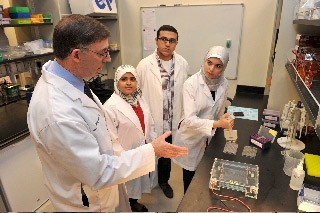WCMC-Q students receive $280,000 in research grants
By Lauren Gold
Twenty-eight Weill Cornell Medical College in Qatar (WCMC-Q) students have received grants totaling $280,000 in the latest, seventh, round of funding from the Undergraduate Research Experience Program (UREP) to conduct advanced research projects with faculty members.
The students will investigate 11 different topics related to cancer treatment and diagnosis, diabetes care, science learning, purifying drinking water, infectious diseases, the function of specific genes, gene therapy for diseases, and the growth and development of children in Qatar.
The grants are part of $1.7 million provided to research institutions in Qatar this year by the Qatar National Research Fund. The program is designed to support hands-on learning by students, build knowledge and bolster Qatar's reputation for research.
"Biomedical research is an integral part of the WCMC-Q mission," said Khaled Machaca, associate dean for research. "Qatar Foundation's support for research through the UREP grants gives our students valuable opportunities to improve their research skills and understand methods for generating new biomedical knowledge."
"Physicians need research skills so they can incorporate evidence-based medicine into their treatment decisions. The UREP projects help them gain skills in scientific method that they will use throughout their careers," added Christopher Ogden, biology lecturer who will work with three premedical students to probe the function of specific genes with a UREP grant.
Student research is a component of WCMC-Q's biomedical research program, which is focused on genetic and molecular medicine and women's and children's health while building the country's research infrastructure.
The latest cycle of approved UREP projects are:
- Use of novel lipids to carry therapeutic genes directly into cancer cells;
- Gene silencing as a technique to probe the function of specific genes;
- Characterizing the potential for HIV transmission beyond injecting drug users in the Middle East-North African region;
- Understanding how students decode graphic representations in order to learn complex processes;
- Analyzing how reading scientific literature affects students' growth of knowledge;
- Developing statistics and methodology for identifying emerging HIV epidemics in high risk Middle East and North African populations;
- Comparing measures of growth, development, nutritional habits and physical activity among school children in Qatar;
- Comparing diabetes care in primary care and hospital settings;
- Developing membrane-based technique to remove acids from chemically purified drinking water;
- Developing molecular tools for cancer diagnosis; and
- Interaction of stem cells and cancer cells in treatment-resistant cancer.
Get Cornell news delivered right to your inbox.
Subscribe